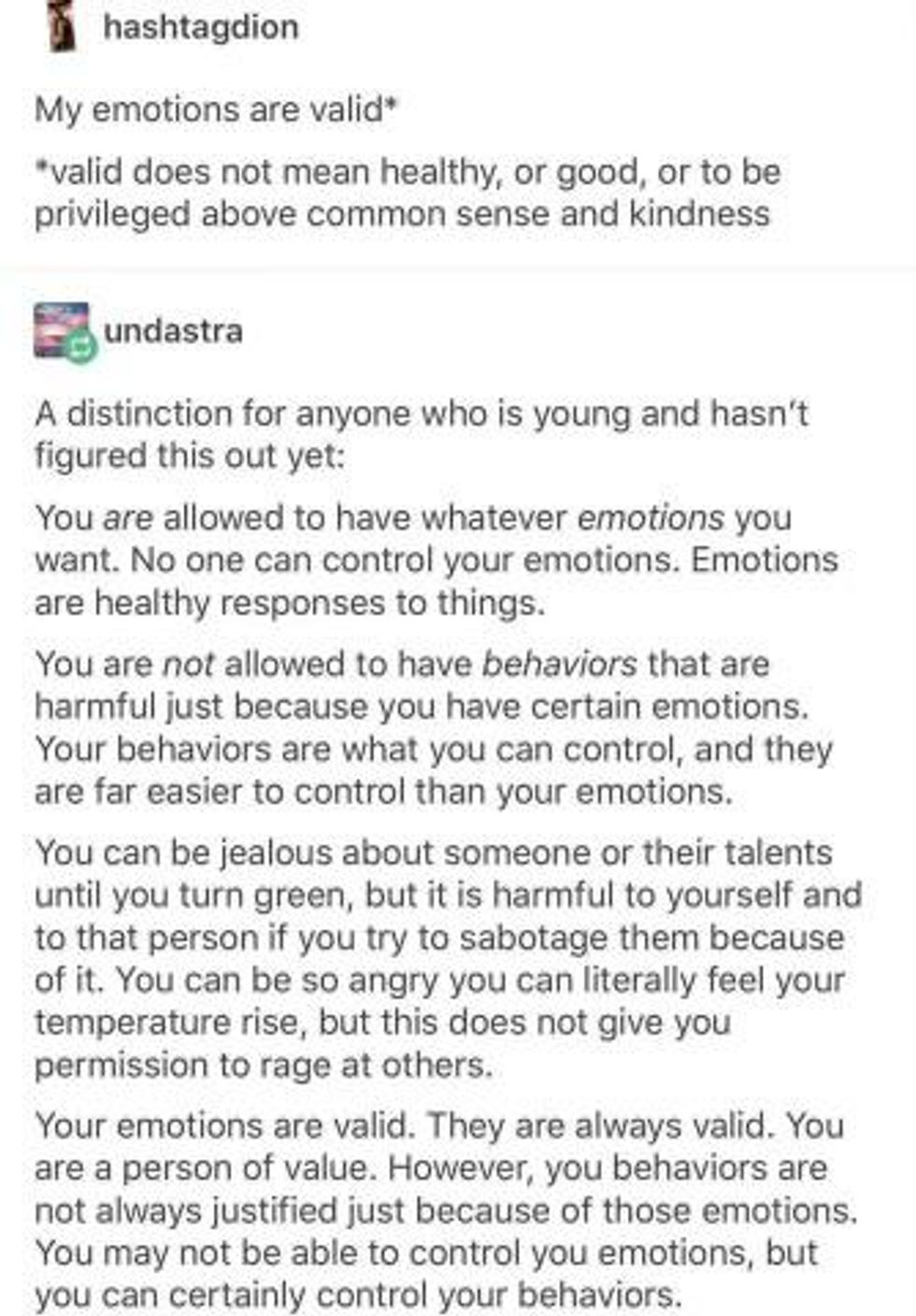This is a topic I've thought about in bits and pieces but was never something I fully conceptualized until recently. As someone with a neurodivergency and multiple other mental illnesses, I often feel like I am not getting enough compassion or mutual understanding from neurotypical people around me. Yet, on the other hand, I can understand how neurotypicals who are trying to support us can feel that we lack understanding about how draining it can be. So, in this article, I will be tackling how to be more aware and mindful of everyone in the situation.
Note: I will be using neurotypical as a general term to describe neurotypical and absence of mental illnesses. I am aware that people can have mental illnesses and be neurotypical. It's just easier for me to use this term to describe this group without using the word "normal." With that being said, there are a few times where I will use neurodivergent to talk generally about the ND/mentally ill population. Again, it's me making this a little bit easier on myself to write.
Don't take mental illness/neurodivergent behaviors personally

I have misophonia, a sound processing "disorder" (it's actually a symptom of anxiety-based disorders). I get triggered by various human-made sounds (singing, humming, whistling, tapping, chewing, etc.). It doesn't matter who's making the sound or whether or not the sound is inherently pleasant. These sounds are a trigger for me and cause immense anxiety, anger, aversion, and distress.
My mom is offended by my misophonia. Whenever her singing triggers me, she says that it offends her and makes her feel like a bad singer. I can understand how someone immediately plugging their ears in discomfort as soon as you start singing can make you feel bad, but you also have to remember:
1. People don't choose their triggers and they have limited control over the behaviors they have to enact to protect themselves.
They are almost automatic, and trying to change these things forcefully results in a lot of distress. Trust me; we don't purposely choose to be triggered by something you do, nor do the behaviors we engage in have anything to do with how much we like you.
2. There's nothing personal to be taken from triggers or behaviors.
What we struggle with has everything to deal with us and our illnesses. It means nothing about you, your skills, your worth, or your adequacy.
3. If what someone does because of their mental illness is offensive to you, take time to figure out why.
If you're taking a situation that's not personal VERY personal, then that's when we need to investigate.
Are you so insecure about your singing that having someone be triggered by it sets you off? Does a certain behavior agitate your self-esteem?
You can feel entitled to your emotions AND acknowledge that your emotions stem from a personal issue and not anything the other person did.
I had to learn this myself about not being able to take criticism. I have a right to my emotions, but at some point, I had to realize why I couldn't accept any criticism and how it's not healthy for me to have such an adverse reaction every time.
I need to work on my self-esteem so I can take criticism healthily. It's not the job of others to withhold corrections in order to protect my feelings and keep me from being offended. It is up to me to take responsibility for my own emotions. If I don't want to be offended by critiques anymore, I need to build my self-esteem.
This leads me to my next point:
4. No one is responsible for your emotions and you are not responsible for anyone else's
Many of us grew up in an emotionally enmeshed environment and feel like we hold responsibility for managing the emotional states of others and vice versa, but that's not true. We are responsible for controlling, processing, and dealing with our emotions.
Do not place the job on your loved ones who are mentally ill and/or neurodivergent to mask in order to make you feel comfortable.
You can feel offended, but to feel deeply offended when something is not personal is a sign of a personal problem. You have to take responsibility for retraining your brain to process emotions properly and to feel secure with yourself. People shouldn't have to mask because you have low self-esteem.
Have more awareness
As people who struggle with mental demons, we can be so consumed by them that we are unaware that our behaviors could negatively impact people.
Personally, I know that my reassurance-seeking-compulsion can actually be very aggravating for other people who have to listen to me ask them the same question dozens of times to make sure. I also know that my social anxiety coupled with my unprocessed trauma makes me prone to oversharing, which is draining to people at times and is socially inappropriate.
Now, this isn't to say, "just stop doing it." I know a lot of us have heard this many times. It is incredibly invalidating and shows a lack of understanding of how hard it is to stop behaviors driven by mental illnesses, especially without therapy.
It's saying take some time to understand and be aware of how that can impact people. It's being able to talk with people and say, "I understand how draining this must be for you. The way you feel is valid, and I acknowledge that."
It's having someone place a boundary and trying your best to respect it, though it may not always be possible depending on your disorder, the severity, and whether you're seeking treatment.
If someone ever placed a boundary I knew I wouldn't be able to uphold, I would respectfully let them know and separate myself.
For the neurotypicals, please understand that it's not a cold-turkey situation. We can't just stop when you say so. It takes a lot of time (and therapy) to stop behaviors, and in some cases, people are completely incapable of stopping the behavior. Be patient, but also hold your boundaries. You can have boundaries with us. We're not an exception. Just understand that some people can be incapable of maintaining your boundaries no matter how hard they try. That's when you need to separate yourself for your mental health.
Anyone that has had a relationship with a narcissist should be familiar with this concept. You hold boundaries, and they keep breaking them over and over. Because of how NPD works, they often have little to no control over the boundary-breaking behaviors. This is why instead of trying to convince them to respect your boundaries for the millionth time, you leave. You recognize their disorder inhibits their ability to respect your boundaries and that they really can't help it, and you can't help it either, which is why you leave because you know it is unlikely to change.
Relationships won't be easy
You have two people whose brains work in two different ways. There are going to be moments of conflict. Please be prepared and mature enough to handle that conflict.
As a neurotypical, you need to understand how their illness impacts different aspects of their life. You need to be able to respect their limits and know what is and isn't possible for them. They don't process the world the same way you do. You have to be patient and compassionate.
As someone with a mental illness and/or neurodivergency, you need to understand that it's hard for them sometimes too. They have their own issues, and they cannot handle all of yours as well. They are not your therapist. They will never be able to understand your disorder fully, and you have to be mindful of that.
These relationships can work if people from both sides hold a level of compassion, understanding, and respect for each other. But if the neurotypical is invalidating, takes things too personally, and stigmatizes, or if the neurodivergent is too emotionally reliant, has unsafe behaviors, and is demanding you pour from an empty cup, it won't work. That's extremely toxic and can honestly be traumatizing for either side.
Currently, there's a lot of miscommunication, toxic behavior, and misunderstanding between us, and no one wants that. We have made many strides in improving the conversation around mental health in recent years, but we still have a long way to go. If you are interested in bettering your connections with your neurodivergent/typical loved ones, then all of this is a good starting point.





















